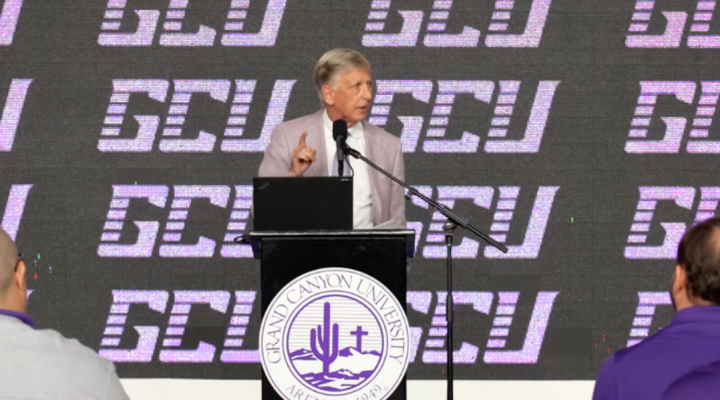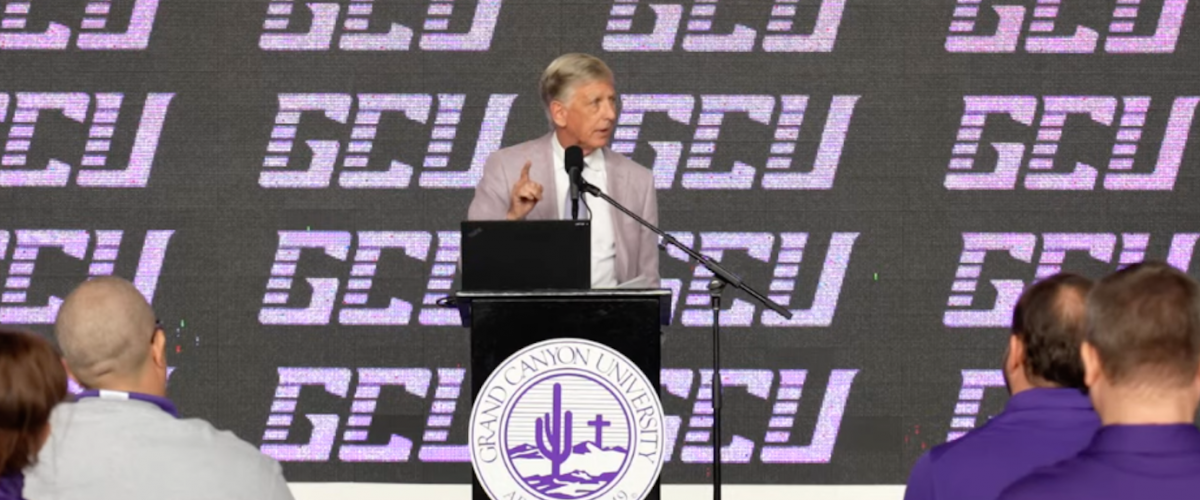Grand Canyon University notified the U.S. Department of Education Nov. 16 it is appealing the record $37.7 million fine imposed on the Christian school for allegedly lying to students about the true cost of doctoral education.
GCU President Brian Mueller called the fine and the upcoming appeals process “a colossal waste of time and a colossal waste of resources” during a livestreamed press conference. He vowed the private school will contest the fine all the way to the U.S. Supreme Court, if necessary.
“We have no desire to do any of this. We have no desire to harm anybody, but there is a group of people in (Washington), D.C., that has the intention to harm us,” he said. “But it doesn’t matter to me if the fine is $37 million or $1. We’re not going to pay the fine because the truth is just the opposite of what they’re saying.”
“There is a group of people in (Washington), D.C., that has the intention to harm us.”
DOE did not respond directly to Mueller’s comments but confirmed it had received the university’s “appeal request” and that it would be referred to the Office of Hearing Appeals for an independent hearing: “The agency’s final decision at the end of that hearing/appeals process may result in a fine in the initiated amount being imposed, a fine in a lower amount being imposed, or no fine being imposed.”
Mueller’s adamant, often fiery, remarks were prompted by an Oct. 31 letter from DOE announcing the fine after an investigation by the Federal Student Aid Office determined the university with Baptist roots had “substantially” misrepresented the costs of certain Ph.D. programs.
The letter said GCU told prospective doctoral students since at least 2017 that its Ph.D. programs would cost them between $40,000 and $49,000 to complete with 60 credit hours. “In actuality, less than 2% of the graduates of its doctoral programs complete with 60 credit hours; whereas more than 98% of graduates were charged additional tuition or fees for continuation courses,” the DOE asserted.
When GCU did disclose additional costs, the information was in small print and “misleading and incomplete,” DOE said.
But Mueller categorically disputed the government’s claims. “None of this makes any sense. It’s completely and totally backward,” he said.
To begin with, GCU uses an enrollment agreement process that maps out credits and costs for undergraduate and graduate students, he said. “That literally says what the student is going to do, every single course they’re going to take for the entirety of their program, not just year one.”
Doctoral students go through the same process, including mapping out likely continuation courses throughout the dissertation process, Mueller contended. “The support we give students in that dissertation process is unprecedented.”
GCU’s accrediting body, the Higher Learning Commission, signed off on the process after a visit in 2021.
“Their recruitment and marketing materials are clear and transparent, and financial information presented to students throughout the student lifecycle is robust,” HLC said in a statement shared by Mueller at the news conference and on the university website.
According to Mueller and a university statement, the agency also cleared GCU’s system for sharing information with doctoral students: “The information and resources provided are robust and thorough, providing prospective students a clear picture of their academic and financial path toward a degree at GCU.”
According to Mueller, the university’s relationship with DOE began to sour in 2018 when GCU reverted to its historical nonprofit status following a stint as a for-profit institution.
The school also reports to more than 20 other accrediting agencies linked to specific academic programs, Mueller said. “We are in incredibly good standing with all of them, from social work to engineering to theology to business.”
According to Mueller, the university’s relationship with DOE began to sour in 2018 when GCU reverted to its historical nonprofit status following a stint as a for-profit institution.
The Internal Revenue Service approved the change of status, which was subsequently recognized by the state of Arizona, the Arizona State Board for Private Postsecondary Education and the Higher Learning Commission. “We were shocked a number of months later to hear that the department was not going to approve our nonprofit status,” he said.
DOE required the university to hire two independent auditing firms to examine the relationship between the university and its previous parent company, Grand Canyon Education. Both audits greenlighted the arrangement, he said. “This was submitted to the Department of Education. They still refused to acknowledge our nonprofit status. After four years we were forced to file a complaint.”
Since then, the department has turned down invitations to visit the Phoenix school and the dysfunction has continued, Mueller asserted. “Any disagreement about the doctoral program could have been handled in a 10-minute phone call.”
The facts support GCU’s case, the president argued: A campus of 900 students some 15 years ago has mushroomed into an in-person student body of 26,000 across 40 locations with another 92,000 in hybrid learning. The university hasn’t raised tuition in nearly two decades and the faculty turnover rate is below 5%.
“There is no better return on higher education than what we are offering here,” he said. “We don’t take any tax subsidies, and our student loan default rates are less than the national average.”
Mueller was asked if he thought the DOE’s actions amount to religious discrimination, given the university’s faith-based status and its founding as Grand Canyon Baptist College. The school originally was affiliated with the Arizona Baptist Convention.
“It’s interesting, isn’t it, that the two largest Christian universities in the country, this one and Liberty University, are both being fined almost the identical amount at almost the identical time? Now is there a cause and effect? I don’t know.”
Mueller was referring to a DOE report leaked in October warning that Liberty could face up to $37.5 million for underreporting and mismanaging sexual abuse claims while receiving federal grants. But those fines have not been assessed so far.
“This is government overreach,” he said. “This is the weaponization of a department that has an opinion that isn’t shared by anybody else. There’s no corroborating evidence to indicate that there’s something nefarious about what’s going on here.”
Related articles:
Department of Education levies $37.7 million fine against Grand Canyon University for lying


